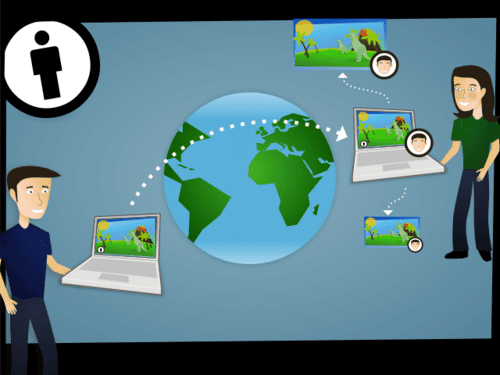Before the invention of the first practical printing press in 1440, every piece of written information in human history had to be done entirely by hand. To own or have access to information meant one had the resources to pay for a hand-written copy of any work, limiting access to information to society’s elite.
But with the printing press, everything changed. The cost of reproducing information was dramatically reduced, and, as it is with any new invention, the opportunity for profit was clear. Now that it could be so easily produced, information itself became a product. In the centuries that followed, novelists, scholars, and journalists used this fact to support themselves, while informing, entertaining, and enlightening the public.

Lets examine how ordinary people use the library in the hypothetical case of Fred and Bob. Fred and Bob both hear from a friend that the new Sylvester Stallone movie, The Expendables, was great, and they both decide they need to see it. Fred’s pockets are feeling kind of light, so he decides to go down to his local library to see if they have it. It turns out they do, so he checks it out and returns it the next day. Bob, on the other hand, doesn’t feel like making a trip to the library so he scours the Internet for links, and downloads the movie from a file-sharing site.
One of these methods is legal, but the other is considered online piracy. Neither Fred nor Bob are paying anything to the filmmaker, yet they both receive the same thing. Except for the fact that in 2011, over 23,000 people in the United States, just like Bob, were sued for illegally downloading The Expendables by the film’s producer. Although the suit was dropped several months after it was first announced, it’s a shocking example of how the concept of open information is, at best, a gray area.
So why is one of these scenarios illegal, while the other isn’t? Well, there are several arguments ranging in validity against file-sharing, as opposed to, other types of open information.
- The library pays for the movie so people can rent it. No one pays for file-sharing. Someone does pay for the original copy of the film before they upload it to the Internet, and because files are often removed due to copyright infringement, the same film accessed via file sharing sites may have been uploaded multiple times by different people who each purchased copies.
- The key is scale. The library serves only the people in the town, who pay tax dollars to use it. When someone uploads a file to the Internet, the whole country could download it. It’s not like everyone in the town who wants to watch The Expendables could do so at any time like they could with file-sharing. This is a valid point, but it is not always true. To test this, I looked on my town’s library web catalog and found that their one copy of The Expendables was in fact checked out. I then decided to look at a more formidable library system, so I searched for The Expendables in the New York Public Library website, the system that serves all of New York City. There were 59 copies of the film available for checkout of the 85 in libraries throughout the city. Although this does mean that the city helped out the filmmaker by purchasing that many copies, they are essentially offering them to over eight million New Yorkers for free use.
This whole analogy is not to say that libraries should be banned or that file-sharing should become an everyday practice in the lives of all Americans, but to question how we, as a country, value and interpret free information.
According to survey data, Generation Y (and really the younger half of the population) is much more comfortable with the idea of file-sharing then older generations. In a 2005 study, 50 percent of respondents aged 20-29, agree that file sharing sites should be allowed, with only 34 percent claiming they should be outlawed. In contrast, only 32 percent of respondents over the age of 30 believe these sites should be allowed.
Does this mean that older generations are against the idea that films and music can be a part of public information? What is more likely is that this is due to the gap in Internet connectivity, rather than morality.

Although this article has mainly argued on the side of the merits of file-sharing, it is not to say that it is an entirely positive thing. Ever since the advent of the Internet, open information has gone one step past the convenience of the printing press to deliver information to people at virtually no cost at all. People deserve to be paid for their work, and illegal file sharing can be harmful. But it is important, as a society, that we understand the ideas behind open information before declaring certain avenues illegal.

